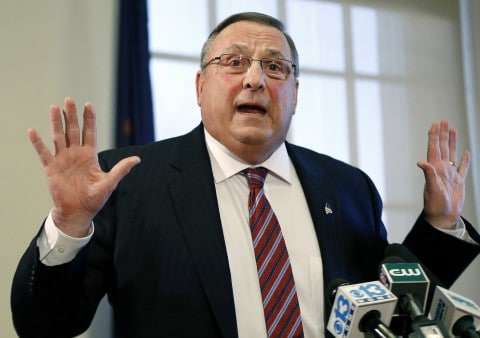The Volokh Conspiracy
Mostly law professors | Sometimes contrarian | Often libertarian | Always independent
Maine Governor Paul LePage says we must counter Obama's "autocracy" with Trump's "authoritarian power"

Maine Governor Paul LePage, a prominent (and early) Donald Trump supporter, worries that President Obama is acting like an autocrat. As he puts it, "we've had eight years of a president, he's an autocrat, he just does it on his own, he ignores Congress and every single day, we're slipping into anarchy."
It's not entirely clear to me how Obama can be promoting both autocracy and anarchy at the same time. Still, even though LePage overstates the point, his complaint has some validity. President Obama does indeed often ignore laws enacted by Congress when they get in the way of his agenda. A particularly blatant example is his illegal deal exchanging five high-ranking Taliban terrorists for captured US soldier Bowe Bergdahl, which violated a federal law forbidding such actions without giving Congress advance notice (which lawmakers would likely have used to block the ill-advised deal). Another egregious example is Obama's violation of the War Powers Act in waging the wars against Libya and ISIS.
How does LePage propose to combat such presidential "autocracy"? He says "we need a Donald Trump to show some authoritarian power in our country and bring back the rule of law." Yes, the above is not a misprint. The solution to presidential "autocracy" is "authoritarian power." And you can trust Trump with that kind of power because, as LePage assures us, he will "protect our nation and fight the debt" and not "go after interns" (except, perhaps, when he wants to gather material for his next round of lighthearted "locker room talk"). The essence of Trumpist ideology is a combination of European-style xenophobic nationalism with the idea that our authoritarian leader is better than the other party's. LePage's statement captures that essence very well.
Trump himself also appears to believe that the solution to abuses of presidential power is to double down on them:
On Meet the Press, Trump was asked whether he would rely on executive action in the manner of President Obama. "I won't refuse it. I'm going to do a lot of things," Trump replied. "I mean, [President Obama] led the way, to be honest with you," he added. But rest assured, Trump noted, "I'm going to use [executive actions] much better and they're going to serve a much better purpose than he's done."
And there's a lot more where that one came from. As they say, you can't make this stuff up.
Perhaps the point is already obvious. But if you truly believe that Obama (or George W. Bush) abused executive power and that we need to prevent such abuses in the future, then you can't simultaneously support Trump's sweeping authoritarian agenda, which is likely to make Obama's "autocracy" seem tame by comparison. As Conor Friedersdorf of the Atlantic puts it, we should instead be working on ways to "tyrant-proof" the executive by enforcing tighter limits on presidential power.
UPDATE: A day after I wrote the above post, LePage claimed that he meant to say "authoritative power," not "authoritarian power." Unlike Obama, LePage now says, Trump has an "authoritative persona" and therefore "does not have to go behind closed doors with community activists to get things done and hurt American people, that's really, what I really meant."
It's certainly true that Trump does not need to involve "community activists" to "hurt American people." He can hurt people all on his own. Otherwise, I don't buy LePage's attempt at supposed clarification. Power is by its very nature "authoritative," in the ordinary language sense of likely to be accepted and obeyed. Otherwise, it isn't really power at all. And I highly doubt LePage meant to refer to "authoritative power" in the technical sense by which the term is used by some sociologists. Rather, I think he meant exactly what he said and is now backtracking in order to quell the negative public reaction. But interested readers should consider both statements and decide for themselves.


Show Comments (0)